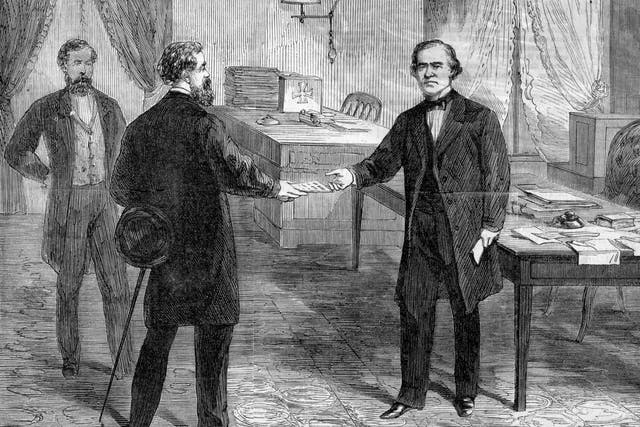

Andrew Johnson (1808-1875), the 17th U.S. president, assumed office after the assassination of Abraham Lincoln (1809-1865). Johnson, who served from 1865 to 1869, was the first American president to be impeached. A tailor before he entered politics, Johnson grew up poor and lacked formal education. He served in the Tennessee legislature and U.S. Congress and was governor of Tennessee.
A Democrat, he championed populist measures and supported states’ rights. During the U.S. Civil War (1861-1865), Johnson was the only Southern senator to remain loyal to the Union. Six weeks after Johnson was inaugurated as U.S. vice president in 1865, Lincoln was murdered. As president, Johnson took a moderate approach to restore the South to the Union and clashed with Radical Republicans. In 1868, he was impeached by Congress, but he was not removed from office. He did not run for a second presidential term.
Andrew JohnsonAndrew Johnson was born on December 29, 1808, in a log cabin in Raleigh, North Carolina. His father, Jacob Johnson (1778-1812), was a porter at an inn, among other jobs, and died when Andrew was 3, while his mother, Mary “Polly” McDonough Johnson (1783-1856), was a laundress and seamstress.
For a 14‑year period, the U.S. government took steps to try and integrate the nation's newly freed Black population into society.
The Tenure of Office Act was designed to rein in Andrew Johnson—but it sparked a years‑long debate on executive power.
As the Civil War was ending, recently freed Black people were promised land to start independent lives—but Lincoln's assassination led to that plan's demise.
In 1866, Johnson vetoed the Freedmen’s Bureau bill and the Civil Rights bill, legislation aimed at protecting blacks. That same year, when Congress passed the 14th Amendment granting citizenship to blacks, the president urged Southern states not to ratify it. (The amendment nevertheless was ratified in July 1868.) During the 1866 congressional elections, Johnson launched a multiple-city speaking campaign, dubbed “a swing around the circle,” in which he attempted to win support for his Reconstruction policies. The tour proved to be a failure, and the Republicans won majorities in both houses of Congress and set about enacting their own Reconstruction measures.
Hostilities between the president and Congress continued to mount, and in February 1868, the House of Representatives voted to impeach Johnson. Among the 11 charges, he was accused of violating the Tenure of Office Act by suspending Secretary of War Edwin Stanton (1814-1869), who opposed Johnson’s Reconstruction policies. That May, the Senate acquitted Johnson of the charges by one vote.
Johnson did not run for reelection in 1868. He had hoped the Democrats would choose him as their presidential nominee, but they opted instead for Horatio Seymour (1810-1886), a former governor of New York. Civil War hero Ulysses Grant, the Republican candidate, won the election and became the 18th U.S. president.
Johnson’s interest in politics and public office did not end once he left the White House in March 1869 and returned home to Tennessee. That same year, he ran unsuccessfully for the U.S. Senate, and in 1872, lost his bid for a seat in the U.S. House of Representatives. He persisted and won election to the Senate in 1875. Johnson was the only ex-president to accomplish this feat; however, his Senate tenure was brief. He died at age 66 on July 31, 1875, after suffering a stroke while visiting family in Carter County, Tennessee.
Johnson was buried in Greeneville with the American flag and a copy of the Constitution.
HISTORY.com works with a wide range of writers and editors to create accurate and informative content. All articles are regularly reviewed and updated by the HISTORY.com team. Articles with the “HISTORY.com Editors” byline have been written or edited by the HISTORY.com editors, including Amanda Onion, Missy Sullivan, Matt Mullen and Christian Zapata.